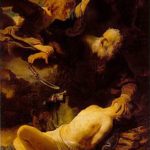Chapters 16 – 21
The Fine Art of Sacrifice
Oh, God said to Abraham, “Kill me a son”
Abe said, “Man, you must be puttin’ me on”
God said, “No” Abe say, “What?”
God say, “You can do what you want, Abe, but
The next time you see me comin’, you better run”
Well, Abe said, “Where d’you want this killin’ done?”
God said, “Out on Highway 61”
Bob Dylan – Highway 61 Revisted
Fundamental to the transformative work of Groups is the Individual work of each and every participant in that group. In our last set of studies we spend extensive time on the Study of the Invocation of Presence. You can find discussions of that volume here.
Each of us must learn to invoke our presence – in the course of doing so, we find we have ‘standing’ to work within a Group. That standing is based upon our ability to stand more and more within our own personal presence.
By its nature, the invocation of the Essential Self involves Sacrifice. It is axiomatic. You leave one Country of existence, you must leave the old country.
“How can one bring oneself to make the first self-initiated sacrifice, that of comfort? One can work in a group, and in this way the group will serve as one’s work will until one has a will of one’s own.” Joy of Sacrifice, page 49
Sacrifice is tricky indeed. It is possibly easy to say, “I will sacrifice for others.” There is clearly something noble in that gesture. However, the first efforts of True Sacrifice are within the hearts of the Aspirant.
Operating Under the Umbrella of a Group
Chapter 19
Consider Chapter 19 – “For Whom Was It Done?” – in this very short chapter G asks the group for their impressions of the events of the previous evening – R- responds, C – responds, M- responds, D- responds, S- responds, and V-responds. G’s answer to each of them can be summed up in his answer to “D” – NO!.
Why did the students continue to ask? What was going on in the individual student as they asked? What did they get out of this process? What is the secret of this procedure?
======
Audio File for Class on 2017_05_03
Chapter 20
More Words of Warning
This is a longer chapter than most, thus far. It is an unusual chapter. G (E.J.) is working to help demonstrate the difference between an ordinary set of efforts and something extraordinary – a Work Effort.
As Chapter 20 begins E.J. asks us what is an extraordinary effort?
“Think of something not ordinary, and tell the group about it” (Page 41)
We will do this exercise during the group class. What will it yield? (Try not to look at the obvious result.)
“We are asked not for just a brief period of time or for life as we may know it, but for our entire future life, to possibly never again rest in peace. Before acceptance we must completely understand with all our Being exactly the full meaning of this covenant. When we accept this, we become subject absolutely to the Law of the Work.” (p. 47)
How can you put your Self in a position whereby your transformation is a necessity for the Group?
Chapter 20 Part II
The Fallen Angels
(p.47) “Exactly who do I represent? Who are fallen angels? What relation do they hold with the Absolute?”
We will explore the concept of the Fallen Angel. Are we fallen angels?
(p.48) –
R: “What do you mean by ‘fallen angel’ “?
G: “You think the suffering of the Absolute is anything? Imagine the suffering of ‘fallen angel’ ”
This second part of chapter 20 explores another dimension of Work on Self. Each moment of our work takes us more deeply into the mystery of our existence and purpose.
“Penetrating so many secrets we cease to believe in the unknowable, but, there it sits nevertheless, calmly licking its chops” [H.L. Mencken]
We will finally introduce ourselves to the Development of Conscience. It can be done, but, the price is high. We peak over the wall of uncertainty and decide whether we are willing to pay the price. But, were you really able to see clearly enough?





One Response to Chapters 16 – 21